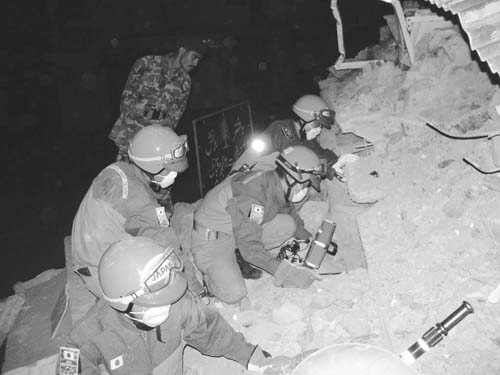Japan's Official Development Assistance White Paper 2006
Main Text > Part I JAPAN'S OFFICIAL DEVELOPMENT ASSISTANCE FOR WORLD PEACE AND PROSPERITY > Chapter 3 Aiming for Strategic, Flexible, and Effective ODA
Chapter 3 Aiming for Strategic, Flexible, and Effective ODA

Japan Disaster Relief Team works after major earthquakes such as one that occurred in Pakistan in October 2005 (Photo: JICA)
Key Points
- Japan's ODA budget decreased by 35% since 1997. On the other hand, Western countries have increased the amount of their external assistance since the terrorist attacks of 2001 in the United States.
- While Japan's ODA contributes to the common agenda of the international community such as the Millennium Development Goals, the needs for the strategic use of ODA are on the rise, for purposes such as democratization, assistance to governance, the promotion of trade and investment, and the securing of resources and energy.
- Japan has established a system to implement strategic ODA through measures such as the foundation of the Overseas Economic Cooperation Council and the International Cooperation Bureau, and the reorganization of JICA. Japan has also worked on improving the quality of its ODA in line with its report entitled Inspection and Improvement of ODA.
As has been demonstrated, for more than half a century Japan's ODA has contributed to both the peace and stability of the international community as a whole and, thereby, the security and prosperity of Japan itself by assisting the socio-economic development of developing countries. However, while fiscal cutbacks are an urgent and significant matter due to serious government deficit, Japanese Government has been substantially reducing the ODA budget after peaking in 1997. In FY2006 the general account budget allocated ¥759.7 billion to ODA, representing a 3.4% decline from the preceding fiscal year, a 35% reduction over the past nine years, and a fall to the level of the 1980s. Contributions to international organizations from the ODA budget have also declined by about 30% (in general account budget terms) over the past nine years. More strategic discussion is called for in order to increase collaboration with international organizations and to strengthen Japan's voice in the international arena.
While Japan reduces its ODA, Western countries, particularly the United States, have increased their overseas assistance since the 9.11 attacks in 2001 in the United States. This is because of the increasing need to use assistance to reduce poverty in developing countries and to secure the peace and stability of the international community as a whole. At the G8 Gleneagles Summit held in July 2005, Japan stated its intent to increase its ODA volume by US$10 billion in aggregate over a period of five years. This trend has prompted Japan to pursue how it should address development issues such as the Millennium Development Goals (MDGs) and other global issues such as infectious diseases, conflicts, and drugs. It is increasingly important for Japan to use ODA in a more strategic and effective manner, one that helps to create an environment of the international community that is favorable to Japan's continued prosperity by ensuring stability in countries and regions through the promotion of democratization and good governance in developing countries, improving the environment of trade and investment, and securing supplies of energy and resources—an approach that harmonizes ODA with Japan's medium- to long-term interests. With these objectives in mind, Japan has been implementing reforms concerning the framework for formulating, planning, and implementing ODA since the beginning of 2006. Japan has established the Overseas Economic Cooperation Council within the Cabinet to act as the headquarters for strategic overseas economic cooperation. In order to enhance the capacity to formulate and coordinate aid policy and international cooperation within the Ministry of Foreign Affairs (MOFA), the Economic Cooperation Bureau, which had been in charge of bilateral assistance, and a corresponding part of the Global Issues Department, which had been responsible for cooperation with international organizations, were integrated; and in August 2006 the International Cooperation Bureau was newly established.
The following sections present Japan's recent moves to strengthen and improve the system of implementing ODA, taking into account its past efforts to deal with the various issues associated with assistance up to now.


 Next Page
Next Page